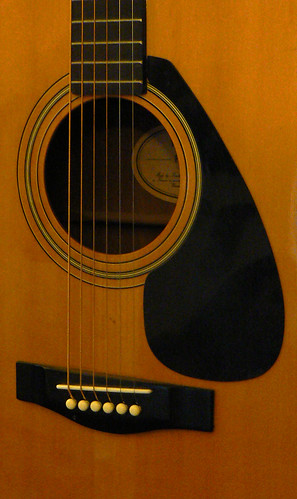Sound and Recording
B. Thomas Cooper
Editor
Judas Priest, influential Heavy Metal band, formed in Birmingham England in 1968, and has gone on to release dozens of successful singles, and selling over 35 million albums over a career lasting four decades.
Originally formed by guitarist K.K. Downing and bassist Ian Hill, the band found worldwide success with vocalist Rob Halford and fellow guitarist Glen Tipton. Of course, after forty years together, the band has experienced more than it's share of ups and downs, and famous ego clashes. Still the band continues to tour and record together, with Scott Travis, formerly of Racer X on drums. Their newest CD, Angel of Retribution, was released in 2005, and the boys are currently in the studio working on a follow up.
Judas Priest may not be the household name it once was, but the band continues to defy expectations, proving their meddle time and again. Indeed, this legendary band has earned it's wings and it's throngs of loyal fans. Judas Priest is not for everyone, but then, they have never tried to be. After forty years at the top of their genre, these guys having nothing to prove, but to themselves.
Sound Foundation Entertainment - blogment - National Newswire - The Infinite Echo - Sound & Recording - Impeachment Now! - Skate the Razor - Skate the Razor Blog
SFE-TV
Skate the Razor - CODA
Coming Soon
Spring 2011
Sound Foundation Entertainment - blogment - National Newswire - The Infinite Echo - Sound & Recording - Impeachment Now! - Skate the Razor - Skate the Razor Blog
Saturday, November 17, 2007
Tuesday, November 13, 2007
S&R Band Review - Muse, Music for Butterflies & Hurricanes
Sound and Recording
B. Thomas Cooper
Editor
Music for Butterflies & Hurricanes. A simple song title or perhaps something more profound? Muse is infinitely smarter than their name implies, churning out complex, oddly mutated old school' Hard Rock from somewhere beyond the fringes.
This three piece juggernaut springs from the minds of guitarist and vocalist Matthew Bellamy, bass player Chris Wolstenholme, and drummer, Dominic Howard, and has released four discs, including their highly successful 2006 release Black Holes and Revelations, featuring the singles, Knights of Cydonia and Supermassive Black Hole.
Indeed, Muse might just be the best UK band you've never heard of. Matthew Bellamy, who also plays keyboards, provides the song-craft, and it's all top shelf. Concise melodies and beautiful fretwork are abundant throughout the bands catalog of catchy tunes. Although the boys continues to chart an impressive growth curve, they have yet to make any appreciable impact across the pond
Over here in the states, bands like Muse are a rare commodity. Modern Rock radio is in dire straights, struggling to gain a foothold in a changing environment. As a result, sometimes great songs get lost in a machine fueled by desperation. Fortunately, Muse has managed to pop its head above that super massive black hole we call radio, and when it happens, we rush to bask in their radiance.
So say what you will, sayer of things naysayers say. Muse has captured my heart and my imagination. The more I listen, the more captivated I become. It goes beyond explanation, really. A sickness, perhaps? Some kind of hysteria, like say Stockholm syndrome? It's always possible, I suppose. After all, I'm just following the muse.
Brad
Sound Foundation Entertainment - blogment -
National Newswire - The Infinite Echo
B. Thomas Cooper
Editor
Music for Butterflies & Hurricanes. A simple song title or perhaps something more profound? Muse is infinitely smarter than their name implies, churning out complex, oddly mutated old school' Hard Rock from somewhere beyond the fringes.
This three piece juggernaut springs from the minds of guitarist and vocalist Matthew Bellamy, bass player Chris Wolstenholme, and drummer, Dominic Howard, and has released four discs, including their highly successful 2006 release Black Holes and Revelations, featuring the singles, Knights of Cydonia and Supermassive Black Hole.
Indeed, Muse might just be the best UK band you've never heard of. Matthew Bellamy, who also plays keyboards, provides the song-craft, and it's all top shelf. Concise melodies and beautiful fretwork are abundant throughout the bands catalog of catchy tunes. Although the boys continues to chart an impressive growth curve, they have yet to make any appreciable impact across the pond
Over here in the states, bands like Muse are a rare commodity. Modern Rock radio is in dire straights, struggling to gain a foothold in a changing environment. As a result, sometimes great songs get lost in a machine fueled by desperation. Fortunately, Muse has managed to pop its head above that super massive black hole we call radio, and when it happens, we rush to bask in their radiance.
So say what you will, sayer of things naysayers say. Muse has captured my heart and my imagination. The more I listen, the more captivated I become. It goes beyond explanation, really. A sickness, perhaps? Some kind of hysteria, like say Stockholm syndrome? It's always possible, I suppose. After all, I'm just following the muse.
Brad
Sound Foundation Entertainment - blogment -
National Newswire - The Infinite Echo
Keywords:
B. Thomas Cooper,
Bands,
Brad Cooper,
Muse,
smusic,
songs,
sound and recording,
soundandrecording
Tuesday, November 6, 2007
Recording Acoustic Guitar, Pt. One Revisited
Sound and Recording
B. Thomas Cooper
Editor
Who says recording an acoustic guitar is difficult?
Oh contraire, my friends. Recording an acoustic guitar is no harder than recording any other acoustic stringed instrument. Oh sure, some simple sonic rules apply, but certainly nothing worth getting high strung about.

I’ll begin by addressing a few of the common misconceptions. Most microphones are designed with a general recording purpose in mind, but there are few hard and fast rules that apply to recording. Although a particular mic may seem appropriate for the setting, there are few guarantees. No two acoustic guitars sound alike, no two rooms sound alike, and no two players play alike. Each recording presents a different set of variables.
Some folks believe a good acoustic guitar sound can only be accomplished by placing the microphone inside the sound-hole of the acoustic. My advise is to forget such nonsense, as it falls dangerously far from the truth, and almost always results in a very poor recording. Even a high quality contact condenser mic mounted inside the instrument produces a compromised result and is generally not used for serious recording. You don’t stick your ears in the sound hole when you listen to an acoustic guitar do you? I certainly don’t.
Indeed, microphone placement is key to recording any acoustic instrument, but it need not be difficult. An acoustic guitar has wonderful ambient and dynamic qualities, often overlooked or misunderstood. Try backing the mic away from the guitar a few inches, pointing the diaphragm toward the sound-hole. Relax, and let the instrument breathe. Changing the axis alignment of the mic, even ever so slightly, can produce startling results. Most importantly, listen for the subtle changes, and learn what is meant by ‘critical listening’. Don’t settle for the first sound you dial in. Take your time, and by all means, enjoy the process.
B. Thomas Cooper
Editor
Who says recording an acoustic guitar is difficult?
Oh contraire, my friends. Recording an acoustic guitar is no harder than recording any other acoustic stringed instrument. Oh sure, some simple sonic rules apply, but certainly nothing worth getting high strung about.

I’ll begin by addressing a few of the common misconceptions. Most microphones are designed with a general recording purpose in mind, but there are few hard and fast rules that apply to recording. Although a particular mic may seem appropriate for the setting, there are few guarantees. No two acoustic guitars sound alike, no two rooms sound alike, and no two players play alike. Each recording presents a different set of variables.
Some folks believe a good acoustic guitar sound can only be accomplished by placing the microphone inside the sound-hole of the acoustic. My advise is to forget such nonsense, as it falls dangerously far from the truth, and almost always results in a very poor recording. Even a high quality contact condenser mic mounted inside the instrument produces a compromised result and is generally not used for serious recording. You don’t stick your ears in the sound hole when you listen to an acoustic guitar do you? I certainly don’t.
Indeed, microphone placement is key to recording any acoustic instrument, but it need not be difficult. An acoustic guitar has wonderful ambient and dynamic qualities, often overlooked or misunderstood. Try backing the mic away from the guitar a few inches, pointing the diaphragm toward the sound-hole. Relax, and let the instrument breathe. Changing the axis alignment of the mic, even ever so slightly, can produce startling results. Most importantly, listen for the subtle changes, and learn what is meant by ‘critical listening’. Don’t settle for the first sound you dial in. Take your time, and by all means, enjoy the process.
Subscribe to:
Comments (Atom)







